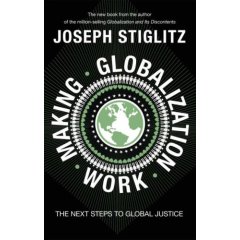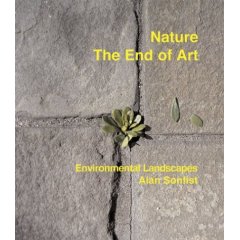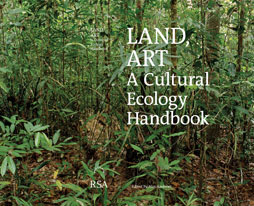om
 Joseph Stiglitz
Joseph Stiglitz
Making Globalization Work
Allen Lane, 2006, 337 STI
Nobel Prize winning economist and an adviser to former President Bill Clinton, Joseph Stiglitz was another highly acclaimed speaker at the RSA lectures that formed part of this years Edinburgh International Book Festival.
Following up from Stiglitz's bestselling book Globalization and it's discontents, his latest book Making globalization work brings us up to date with the rapid development of globalization in recent years, and provides crucial insights into ways in which globalization can be managed and directed towards the greater good of the world population. Addressing the generally negative public attitude towards globalization, Stiglitz not only reminds us of the many benefits that the developed world enjoys because of globalization, he also asserts the great potential of globalization to benefit all. In order for this to happen changes need to be made; the reform of global institutions such as the UN, the IMF and the Work Bank, as well as the creation of a system for overcoming international financial instability, are just some of the recommendations Stiglitz makes. His overwhelming message is of our need to understand global problems such as third world debt and the threat of global warming, and to address them by thinking and acting as one global community. In Making globalization work, Stiglitz devotes whole chapters to the subjects of debt in the developing world and global warming, his solution for the later being a common global tax on carbon emissions. In an interview with the Sunday Times newspaper, Stiglitz praises Britain for taking a leading role on tackling climate change. A clear example of this is the success of projects such as the RSA's CarbonLimited, which has already had a significant impact in government and specialist circles, so much so that environment minister David Miliband is involved in the project.
Why not join the likes of David Miliband, Jon Snow, Alex James and RSA Chairman Gerry Acher in calculating your personal carbon emissions by registering with CarbonLimited's CarbonDAQ.

 The RSA Arts & Ecology project , a programme supporting the work of the arts in examining and addressing environmental concerns in an international arena, is holding a conference in December 2006 entitled "No Way Back". Providing different perspectives on ecological issues from major thinkers of our time, and timed to coincide with the new project publication Land, art: a cultural ecology handbook, the conference illustrates the significant progress being made in this area by the RSA in association with Arts Council England.
The RSA Arts & Ecology project , a programme supporting the work of the arts in examining and addressing environmental concerns in an international arena, is holding a conference in December 2006 entitled "No Way Back". Providing different perspectives on ecological issues from major thinkers of our time, and timed to coincide with the new project publication Land, art: a cultural ecology handbook, the conference illustrates the significant progress being made in this area by the RSA in association with Arts Council England.
The RSA library contains a wealth of resources in this area, including books such as Nature: the end of art - environmental landscapes, a collection of works by Alan Sonfist. The New York City based artist who came to prominence in the 1960's, is a pioneer of narrative environmental art and a leader in the Earth/Land Art Movement. His work illustrates the significant tradition of combining art and the environment to promote social change - of which the RSA is now a major contemporary contributor.
John Simmons, Rob Williams & Tim Rich (ed.)
Common Ground: around Britain in 30 writers
Marshall Cavendish Editions, 2006, 914.104 COM
Common ground is a celebratory tour around literary Britain. Discussing the relationships between writers and the places where, or about which they write, and commenting on the way both writer an place mutually enrich each other, Common ground also asks what is "the influence of the places that nurtured those works - on ourselves and our subjects?"
Common ground is certainly not an attempt to document every author who has ever become heavily associated with a particular place in Britain, and it is not until you learn more about 26, the not-for-profit literary organization that produced this book, that you begin to understand why it features such an eclectic mix of some the most famous of all British writers, and a number of considerably lesser know writers. For a start, the book is written by 30 different members of the 26 organization, each of whom was responding to an organization wide challenge to write a piece about an author-place relationship that meant something special specifically to themselves. As a group, 26 are concerned with words in general, and many of their founders come from the worlds of advertising, journalism and communications, and so they are perfectly happy to include lyrical musicians such a Van Morrison or the somewhat obscure Stuart Murdoch of the band Belle & Sebastian as "writers". The result is a varied and engaging discussion of both writers that you are familiar with, and those you are almost certainly not. Not only is Common ground a pleasure to read, it just might renew some of your enthusiasm for different literature and music too.
Contributors of note include Ali Smith (winner of the Whitbread Novel Award 2005) and acclaimed novelist Niall Griffiths.
 Joseph Stiglitz
Joseph Stiglitz

